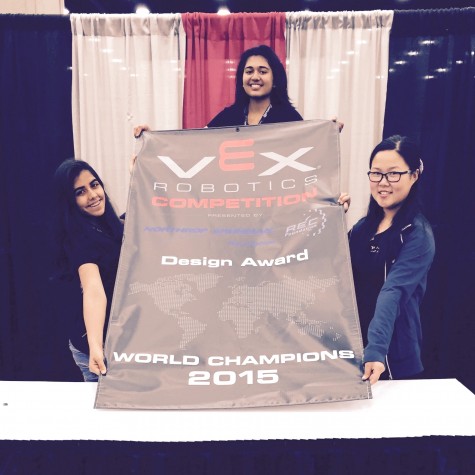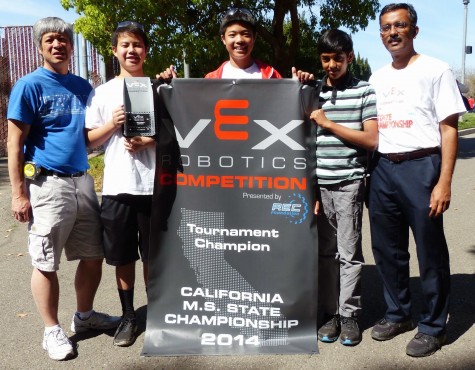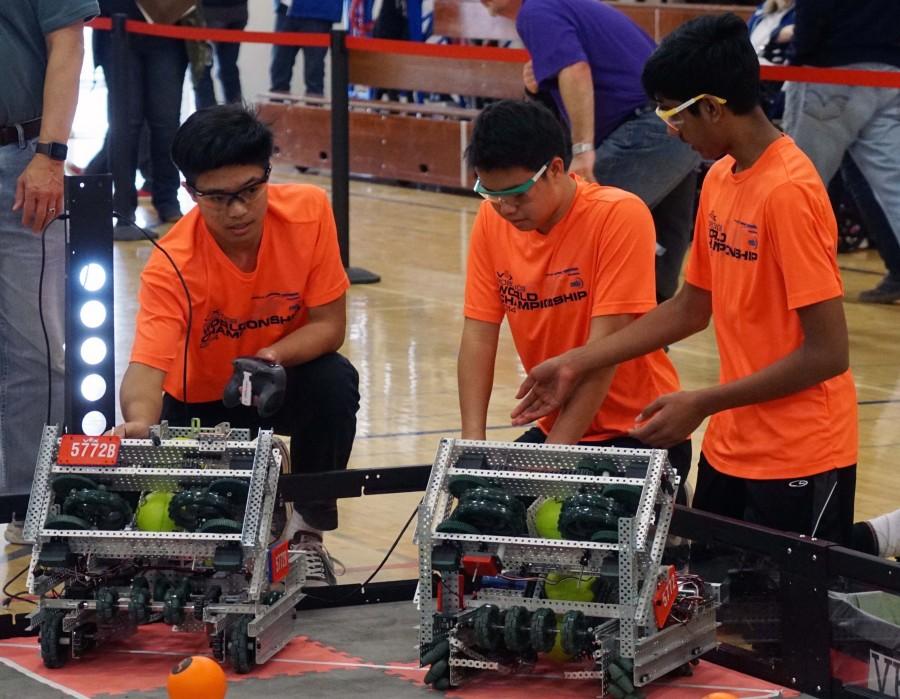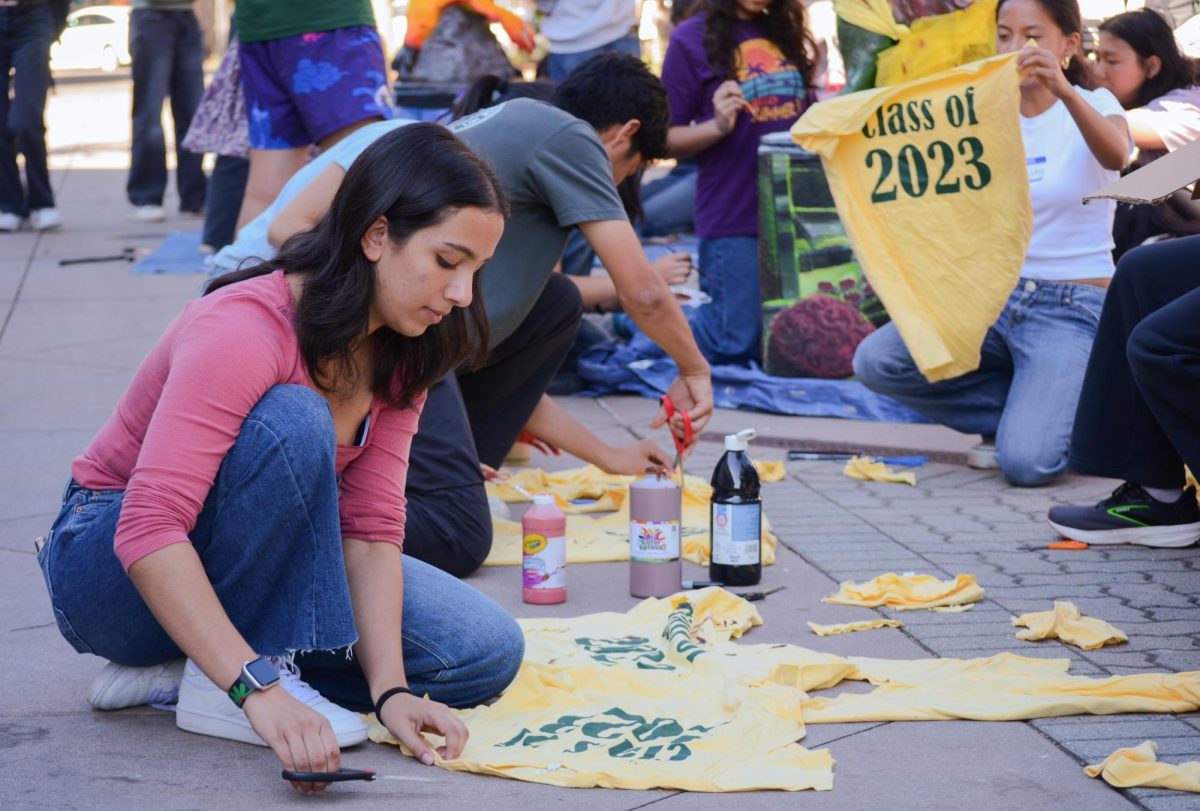Students compete in VEX Robotics tournaments
Teams win awards at regional, state, international levels
Provided by Christopher Gong (9)
Freshmen Christopher Gong, Andrew Chang and Kaushik Shivakumar consider their robot during a VEX tournament. The team has won multiple awards at both the middle school and high school levels.
April 3, 2016
The sound of frantic voices and conversations fill the cramped space as dozens of teams bustle around their robots, making split-second decisions and fixes. Teams have chosen their alliances and continue to prepare for the final stages of the robotics tournament.
The annual VEX Robotics Competition is open to students in grades three through 12. Although the upper school has no official VEX robotics team, many students still participate.
Sophomores Aria Coalson, Maya Kumar, Anooshree Sengupta, Jessica Susai and Akshaya Vemuri compete in VEX. They typically spend eight hours each weekend working on their robot and preparing for tournaments.
“At the beginning it was kind of tough because I’d never done it before, but when you have a team that works so well together, it’s not as intense,” Akshaya, who joined the team this year, said.
The team has attended five tournaments this year, including the state competition on March 5. They have received multiple design awards and were tournament finalists this year. As freshmen, they won two tournaments, earned excellence awards, became semifinalists at the state level tournament and competed at the international level in 2014 and 2015, where they won a design award.

Sophomores Aliesa Bahri, Anooshree Sengputa and Mona Lee pose with their Design Award from the 2015 VEX Robotics Competition World Championships. The team has won awards at the regional, state and international levesl.
Another popular robotics competition is the First Robotics Competition (FRC). Akshaya was a member of FRC Team 1868, “The Space Cookies,” in her freshman year.
“VEX is a lot smaller because our team only has five people versus the large FRC team, so everyone really plays a crucial role and has individual tasks to do every time,” she said.
Freshmen Andrew Chang, Chris Gong, Kaushik Shivakumar, Rithvik Panchapakesan and Eric Wang have been participating in VEX for four years. They have won awards for excellence, design, innovation and programming skills and have been named tournament champions several times in the middle school and high school divisions.
“[My favorite part is] being able to design a bunch of different stuff and being able to actually works hands on with parts in programming and seeing what we actually create [and] what it does,” Chris said.
Sophomore Mona Lee participates in VRC in a one-person team. She began building her robot in July and typically spends seven to eight hours a week working before a tournament.
“You need to keep up with the competition and stay ahead of it, and that’s really difficult to manage, especially since I’m a pretty small team, we don’t have time to try out each design that comes along,” Mona said. “There are different types of robots that develop throughout the year and people find more effective ways of doing things, so then the scores go higher, the competition gets a lot more competitive. There’s a very significant learning curve.”
This year, she has won awards for excellence and programming skills and has been named a finalist, semifinalist and champion at three different tournaments. Mona is now eligible to attend the the World Tournament.
“I love the tournaments and how much strategy goes into all the decisions,” Mona said. “You can see that people are very dedicated, and it’s really interesting to see what they bring to the tournament. It’s a very nice experience to talk to and socialize with teams from all over the world, since we’re all passionate about the same thing.”
Andrew has had several similar experiences at tournaments.
“We make a lot of new friends from other schools and we get to experience a lot and meet a lot of really, really smart people,” he said.
Each year’s game challenge is released each April at the VEX Worlds tournament, and teams work on designing, building and programming their robot throughout the year, typically in preparation for multiple tournaments.
This year’s challenge, “Nothing but Net,” involves alliances of two teams each trying to throw balls into a low goal, worth one point, or a high goal, worth five points. Alliances can win up to 50 additional points at the end of a match for lifting their partner robot. Each match consists of a 15 second autonomous period and one minute and 45 seconds in which the driver controls their robot.
Mona’s and Andrew’s teams will both attend VEX worlds, which will take place from April 20 to 23 in Louisville, Kentucky.

Christopher, Andrew and Kaushik pose with two of their mentors and a their banner award from the 2014 California Middle School Championships, where they became tournament champions in the seventh grade.
In the original version of this published piece in The Winged Post, Kaushik Shivakumar was incorrectly misidentified in two photographs and in the team roster. The piece was corrected for publication online on April 3, 2016.


















![“[Building nerf blasters] became this outlet of creativity for me that hasn't been matched by anything else. The process [of] making a build complete to your desire is such a painstakingly difficult process, but I've had to learn from [the skills needed from] soldering to proper painting. There's so many different options for everything, if you think about it, it exists. The best part is [that] if it doesn't exist, you can build it yourself," Ishaan Parate said.](https://harkeraquila.com/wp-content/uploads/2022/08/DSC_8149-900x604.jpg)




![“When I came into high school, I was ready to be a follower. But DECA was a game changer for me. It helped me overcome my fear of public speaking, and it's played such a major role in who I've become today. To be able to successfully lead a chapter of 150 students, an officer team and be one of the upperclassmen I once really admired is something I'm [really] proud of,” Anvitha Tummala ('21) said.](https://harkeraquila.com/wp-content/uploads/2021/07/Screen-Shot-2021-07-25-at-9.50.05-AM-900x594.png)







![“I think getting up in the morning and having a sense of purpose [is exciting]. I think without a certain amount of drive, life is kind of obsolete and mundane, and I think having that every single day is what makes each day unique and kind of makes life exciting,” Neymika Jain (12) said.](https://harkeraquila.com/wp-content/uploads/2017/06/Screen-Shot-2017-06-03-at-4.54.16-PM.png)








![“My slogan is ‘slow feet, don’t eat, and I’m hungry.’ You need to run fast to get where you are–you aren't going to get those championships if you aren't fast,” Angel Cervantes (12) said. “I want to do well in school on my tests and in track and win championships for my team. I live by that, [and] I can do that anywhere: in the classroom or on the field.”](https://harkeraquila.com/wp-content/uploads/2018/06/DSC5146-900x601.jpg)
![“[Volleyball has] taught me how to fall correctly, and another thing it taught is that you don’t have to be the best at something to be good at it. If you just hit the ball in a smart way, then it still scores points and you’re good at it. You could be a background player and still make a much bigger impact on the team than you would think,” Anya Gert (’20) said.](https://harkeraquila.com/wp-content/uploads/2020/06/AnnaGert_JinTuan_HoHPhotoEdited-600x900.jpeg)

![“I'm not nearly there yet, but [my confidence has] definitely been getting better since I was pretty shy and timid coming into Harker my freshman year. I know that there's a lot of people that are really confident in what they do, and I really admire them. Everyone's so driven and that has really pushed me to kind of try to find my own place in high school and be more confident,” Alyssa Huang (’20) said.](https://harkeraquila.com/wp-content/uploads/2020/06/AlyssaHuang_EmilyChen_HoHPhoto-900x749.jpeg)










